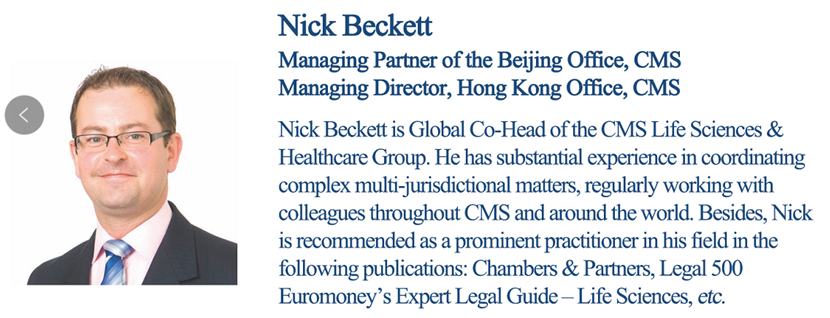On May 13, 2021, approximately 120 students from the China-EU School of Law attended a special lecture on the fascinating topic of “Look Before You Leap – Avoiding IP Pitfalls in Doing Business Cross Border between Europe and China”. This was the fourth session of the International Legal Lecture Series in the Master of European and International Law elective module. The lecture was given by Mr. Nick Beckett through Microsoft Teams Meeting. Professor Monty Silley was the host of the lecture.
Mr. Beckett is the managing partner of the Beijing Office of CMS as well as the managing director of the Hong Kong Office of CMS. He is also the global co-head of CMS Life Sciences and Healthcare Group and the head of Asia-Pacific IP.

The main content of this lecture was divided into two parts. The first part, on IP due diligence, introduced the role of IP due diligence in a transaction, key considerations in determining the extent and depth of investigation into IP issues, the data to be reviewed and establishing loss of exclusivity. The second part focused on a freedom to operate (FTO) assessment, including its importance and key stages, the time to consider it and possible countermeasures to mitigate risk.

Mr. Beckett began by reviewing the concepts of IP, noting that IP due diligence is required when IP is an important part of the transaction. With regard to IP due diligence, Mr. Beckett addressed the key factors in determining to what extent and depth to conduct it. The initial scope of IP due diligence should be based on budgets, timeframe, importance of IP to the transaction and nature and frequency of reporting. Moreover, priority products and priority jurisdictions need to be considered, and the initial research should focus on the patents covering the IP right owner’s core technology. In addition, Mr. Beckett discussed with the students the scope of the data to be reviewed in the IP due diligence process and clarified to students the content of establishing loss of exclusivity, including registered protection, unregistered protection and other points to consider.

The second part was about a freedom to operate (FTO) assessment, which is aimed at avoiding the risk of patent infringement. FTO assessment should be conducted prior to the transaction to make sure the company can market and sell the products without infringing the patent rights of external third-parties now or in the future. Otherwise the company may face risks of injunctive relief, financial relief or corrective relief. Mr. Beckett pointed out that an FTO assessment needs to be conducted when there are changes in business or in laws and regulations, as well as developments in the company or its competitors. Mr. Beckett then focused on how to conduct an FTO strategy, introducing planning, profiling and searching, analyzing, reporting and reviewing in detail, and reminded the students of the budget and other practical constraints. Finally, with regard to the potential infringement risks identified in the FTO assessment, Mr. Beckett listed a number of options available to a potential infringer in decreasing order of risk.
In the Q&A session that followed, the students actively asked questions on how to determine patent infringement, considerations of patent search and the analysis process, among other issues. Mr. Beckett not only answered all questions thoroughly, but also left room for further reflection. He invited students to apply for internships in order to hone their practical skills dealing with complex intellectual property legal issues. Finally, Mr. Beckett sent his sincere wishes to all the students and the lecture ended in pleasant atmosphere.
Original text written by: Yang Xinyue (Double master's student from 2019 intake)
